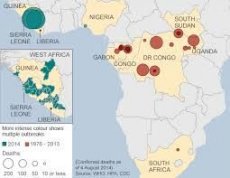New publications
The magnitude of the Ebola virus disease has been underestimated for several factors
Last reviewed: 02.07.2025

All iLive content is medically reviewed or fact checked to ensure as much factual accuracy as possible.
We have strict sourcing guidelines and only link to reputable media sites, academic research institutions and, whenever possible, medically peer reviewed studies. Note that the numbers in parentheses ([1], [2], etc.) are clickable links to these studies.
If you feel that any of our content is inaccurate, out-of-date, or otherwise questionable, please select it and press Ctrl + Enter.

The extent of the Ebola outbreak, particularly in Sierra Leone and Liberia, was underestimated by experts for a variety of reasons.
Most families hide close relatives who are infected with the virus at home. This is because there is no effective treatment for the virus, and many keep their loved ones at home to make it easier for them to die.
In addition, many people deny that their relatives have Ebola and believe that keeping a patient in an isolation ward will only worsen the patient's condition and hasten death. Most also fear stigmatization and social rejection not only of those infected with the Ebola virus, but of all members of their families.
Outbreaks of the disease spread quite quickly, which creates many problems for international cooperation. The number of volunteers, personal protective equipment and other equipment is insufficient in the current conditions, clinics and diagnostic centers are overloaded, most of them are closed, as health workers are leaving en masse, and patients simply do not seek help.
In some rural areas, Ebola victims are buried without a cause of death being determined or reported to health officials. Epidemiologists have sometimes visited villages to estimate the number of people who have died from the virus from freshly dug graves.
Some areas of Liberia are experiencing extremely high levels of infection. Newly opened medical facilities are quickly overwhelmed with Ebola patients, most of whom are being diagnosed with the virus for the first time. This confirms the presence of patients who have not been identified by the surveillance system and are considered unaccounted for.
A 20-bed Ebola treatment center was recently opened in the Liberian capital Monrovia, but it was immediately overloaded by nearly four times its capacity.
Another problem identified is the “shadow zone,” i.e. villages where there is every reason to assume the spread of the Ebola virus, but it is not possible to conduct a normal study in these areas due to the refusal of community representatives to allow health workers into the village or a shortage of volunteers and transport.
In some areas, particularly Monrovia, almost all health services are closed.
It was the lack of any kind of medical care that sparked a riot at an Ebola detention center in West Point, a slum area where the virus is most prevalent.
There is also an opinion among residents that the building of one of the abandoned schools for the sick, which was converted into an isolation ward, is in fact a hospital for providing general medical services. People who brought relatives sick with fever to the isolation ward were allegedly placed in wards with infected patients.
The West Point community expressed dissatisfaction with the presence of sick people from other communities, which led to a subsequent riot and looting. As a result of such actions, many infected materials ended up in the hands of the community.
Epidemiologists from the World Health Organization in Liberia and Sierra Leone are working with other agencies, including the Centers for Disease Control and Prevention in the United States, to develop a more robust estimate of the true extent of the virus's spread.
